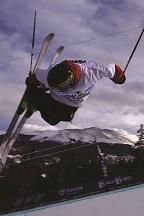

Among the pursuits you might find described as action sports are anything from bungee jumping to cave diving to hang gliding to rock climbing – and a variety of others. In general, action sports share the common denominator of being perceived as dangerous pursuits – or at the very least, as sports that involve having some degree of personal risk to the athlete. As a result of this, they have developed the image of being outside the mainstream and engaged in only by those who want to live ‘on the edge.’
Paradoxically, the sport is populated by athletes who are the antithesis of the elite superstars. Even at the highest levels, they tend to be friendly and down-to-earth—and young, with the key demographic being from the teens to the twenties. Other sports that have arisen with a so-called ‘extreme’ nature, such as obstacle racing, seem to serve those in their thirties and beyond – although it is impossible to generalize since there are exceptions to every rule.
But while it’s easy to stereotype, it’s also easy to see that America’s fascination with this extreme or action sports isn’t going away; it is growing and drawing in more participants and more potential participants all the time. In fact, entire industries have sprung up around the sport, and skilled athletes have emerged in their given disciplines. Accordingly, forums were needed for showcasing the skills of athletes in various disciplines. In addition, since action sports hold a fascination for spectators, they draw strong audiences, both in person and through the media.
In its ninth year, the Dew Tour remains a leader in the action sports industry as it brings the disciplines of BMX, skateboarding, freestyle motocross, snowboarding and freeskiing to the nation’s consciousness. As the Dew Tour heads into their final event of the 2013 season, the Dew Tour iON Mountain Championship, we catch up with Vice President and General Manager, Kenny Mitchell.
Dew Tour History and Popularity:
The Dew Tour was created eight years ago, in partnership with Mountain Dew (known in the tour as Mtn Dew), to support the growth of action sports through multiple events across the country. Last year, we recognized the needs of the industry had changed, and there was no longer the necessity for a seven-event series.
As a result, we made a strategic decision to create three larger, more impactful showcase events. This allowed the property to strike a balance between core disciplines and progressive events, while bringing our consumers a premium experience across broadcast, digital and on site. Our main goal is to continue to progress and grow the action sports industry from all aspects. Dew Tour brings tremendous value to both the summer and winter landscapes with our aggressive distribution platform and overall infrastructure. We’ll continue to pay close attention to each sport and its progression.
The Dew Tour hosts great live events and delivers exciting, engaging television and digital content. By always evolving our content and how we’re delivering it to fans, we’re able to increase awareness for the tour and keep our existing fans engaged. Keeping the athletes and industry in the mix is important as well.
By working directly with the athletes and industry leaders, we’re able to drive progressive disciplines and create groundbreaking courses the athletes enjoy riding, skating or skiing. We strive to constantly think of new ways to challenge our athletes and create an environment for our fans that is fun and inspiring.
Alli Sports and Mountain Dew have a long term commitment to the action sports landscape and have every intention of delivering best-in-class competitions that fill the ever-changing needs of the athletes, fans and industry for years to come.
 Event Location Selection
Event Location Selection
Picking cities for the different events means looking at a whole range of different factors. We take into consideration the accessibility and accommodations that can be made, as well as what makes the city unique and how it fits with the sports we want to host. Recently, we made a strategic decision and changed our business model: we now have three distinctive events – Beach, City and Mountain. Each of these competitions, combined with live music and special events, showcases sports in different terrains and draws people in to make for a fun spectator experience.
Our year started in Ocean City, MD, for the 2013 Beach Championships, then moved to San Francisco for our Toyota City Championships event, which culminated with a streetstyle event that brought to life the downhill nature and action sports culture of San Francisco.
In terms of mountain sports, Breckenridge has been a fantastic host from their continued support for the action sports movement and the growth of snowboarding over the years. Our event is typically held in early to mid-December, which makes this one of the earliest big on-snow events of the year. A lot of mountains do not have snowmaking capability that early in the season; however, Breckenridge does and we are grateful. The iON Mountain Championships include freeskii and snowboard events.
Freeskiing is something we will see included in the Winter Olympics in Sochi, which should really act as a showcase. We are expecting to see a lot of awareness of the sport with the Olympics, which we hope will lead to more interest in freeskiing.
Demographic
Action sports offer a lot of diversity for the athletes and fans all over the world. It is sometimes overlooked that these sports are extremely inclusive and that we see fans and participants of all ethnic backgrounds.
What also makes action sports unique is that many of the fans are participants in those sports themselves. If you were to go into a football stadium, most of the fan base has doesn't currently play the sport. There may be 60,000 people in the arena, but for the most part they are not participants. By comparison, if you were to attend an action sports event such as skateboarding, skiing or snowboarding, you will find a lot of people who are not only fans but participants in those sports at some level. We find this to be especially true in our core demographic of teenagers and young adults between the ages of 13-24.
Action sports promote an influential lifestyle that is continuing to grow and evolve. There is an increased amount of attention being paid to action sports, something that will be evident in NBC’s upcoming coverage of Sochi 2014. There is definitely a bright future ahead for the action sports world and Dew Tour looks forward to be on the forefront of this movement.

